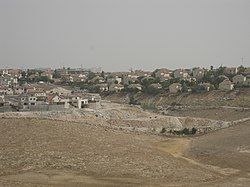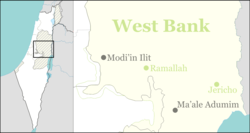Kedar (Israeli settlement)
Kedar | |
|---|---|
 | |
| Coordinates: 31°45′20″N 35°18′34″E / 31.75556°N 35.30944°E | |
| District | Judea and Samaria Area |
| Council | Gush Etzion |
| Region | West Bank |
| Affiliation | Mishkei Herut Beitar |
| Founded | 1984 |
| Founded by | Betar movement |
| Population (2022)[1] | 1,649 |
Kedar (Hebrew: קֵדָר) is a rural Israeli settlement in the West Bank. Located to the south of Ma'ale Adumim and organised as a community settlement, it falls under the jurisdiction of Gush Etzion Regional Council. In 2022 it had a population of 1,649.
The international community considers Israeli settlements in the West Bank illegal under international law, but the Israeli government disputes this.[2]
Name
The name is taken from the Song of Songs:[3] "Dark am I, o daughters of Jerusalem, dark like the tents of Kedar" (Song of Songs 1:5).
History
According to ARIJ, Israel confiscated 45 dunums of land in 1984 from the Palestinian village of as-Sawahira ash-Sharqiya in order to construct Kedar.[4]
The council was established in 1984[5] by families linked to the Betar movement.
After Palestinian gunmen killed one Israeli and injured five Israelis near Ma'ale Adumim, Israel's far-right Finance Minister Bezalel Smotrich in February 2024 announced a "settlement response" after speaking to Prime Minister Benjamin Netanyahu and Defense Minister Yoav Gallant, as "any harm to us will lead to more construction and more development and more of our hold all over the country", with 300 more homes in Kedar being arranged for approval.[6] American Secretary of State Antony Blinken criticized the announcement, stating that new Israeli settlements are "inconsistent with international law" and "counter-productive to reaching an enduring peace", risking "Israel’s security".[6] Haaretz reported that Israel's government in March 2024 progressed the approval of 330 more settler homes in Kedar.[7][8]
References
- ^ "Regional Statistics". Israel Central Bureau of Statistics. Retrieved 21 March 2024.
- ^ "The Geneva Convention". BBC News. 10 December 2009. Retrieved 27 November 2010.
- ^ "Carta's Official Guide to Israel and Complete Gazetteer to all Sites in the Holy Land. (3rd edition 1993) Jerusalem, Carta, p.383, ISBN 965-220-186-3
- ^ As Sawahira ash Sharqiya Town Profile, ARIJ, pp. 18-19
- ^ "Gush Etzion". Gush Etzion. Archived from the original on 2011-07-21. Retrieved 2011-08-24.
- ^ a b Frankel, Julia (24 February 2024). "Israel plans to build 3,300 new settlement homes. It says it's a response to a Palestinian attack". Associated Press. Retrieved 25 February 2024.
- ^ Gritten, David (6 March 2024). "Israel approves plans for 3,400 new homes in West Bank settlements". BBC News. Retrieved 7 March 2024.
- ^ Shezaf, Hagar (6 March 2024). "Israel's Approves Construction of 3,476 Housing Units in West Bank Settlements". Haaretz. Retrieved 7 March 2024.
External links
- Gush Etzion Regional Council: Kedar (archived website)

